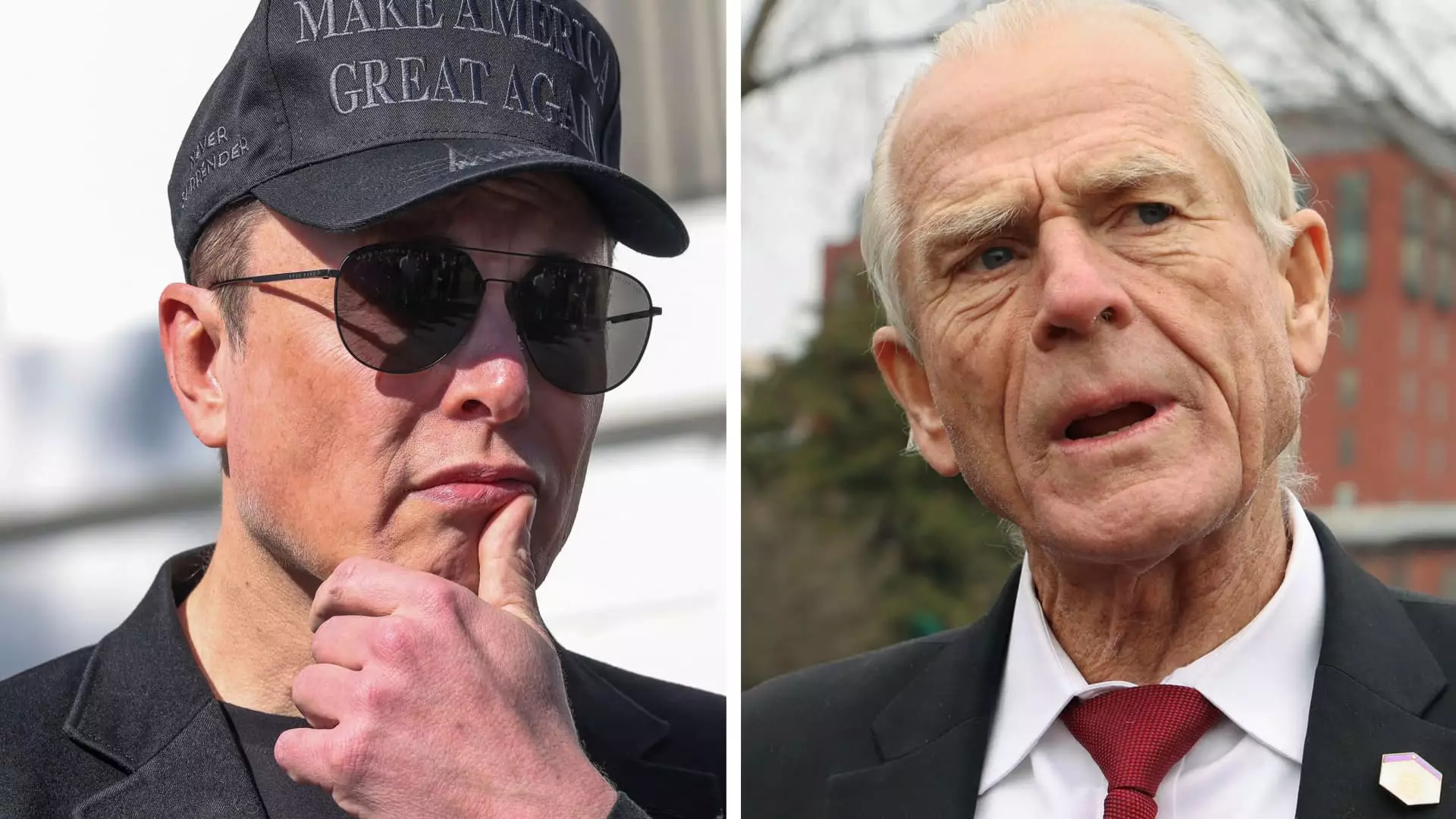In recent weeks, the once unassailable stock prices of Tesla have taken a disheartening plunge, marking a staggering decline of 22% in a mere four trading sessions. The repercussions of this descent aren’t just limited to investors—they ripple through the very psyche of Tesla’s CEO, Elon Musk. As he feels the weight of lost billions, Musk has taken to social media not only to express his frustration but also to engage in a verbal conflict with Peter Navarro, a prominent trade advisor to former President Donald Trump. The stakes of this interaction transcend mere chit-chat; they illustrate the tumultuous intersection of business, politics, and trade policy in contemporary America.
Musk’s Outspoken Nature Unleashed
Musk, often renowned for his bold and unfiltered comments, showed no restraint in his criticism of Navarro. He publicly questioned the value of Navarro’s academic credentials, derisively suggesting that having a PhD from Harvard was more detrimental than advantageous. By labeling Navarro as “truly a moron” and “dangerously dumb,” Musk encapsulated an escalating war of words. This confrontation isn’t just personal; it exposes the turbulence within Trump’s administration regarding trade strategies. While Navarro seems to represent a hardline approach favoring tariffs, Musk’s remarks indicate that he is looking for a more liberal trade environment in which Tesla can thrive.
Tariffs and Their Implications
At the heart of Musk’s contention lies a deep concern over the recent tariffs imposed on over 180 countries, coupled with existing tariffs on imported materials and components crucial for Tesla’s operations. Analysts had previously posited that Tesla’s domestic production capabilities could insulate it from the brunt of tariffs, a theory now being put to the test as operational costs threaten profitability. Material costs from countries like Canada and Mexico, which supply essential resources such as steel and aluminum, are at risk of skyrocketing. Musk’s sweeping statement advocating for a “zero-tariff situation” further underscores that he believes in the necessity of seamless international trade to sustain and enhance Tesla’s global position.
The Ripple Effect on Business Decisions
While Musk’s combative remarks may provide a semblance of catharsis in the short term, there are broader ramifications for Tesla. The company recently reported a concerning 13% drop in year-over-year deliveries. Failing to meet analysts’ expectations at this critical juncture only adds to the unease surrounding Tesla’s future. Musk’s distractions in high-profile political skirmishes may inadvertently divert focus from his company’s operational challenges, which include handling protests and boycotts aimed at Tesla due to Musk’s provocative public persona. This could be a pivotal moment where the consequences of Musk’s political engagements are being felt on the business front.
The Cultural Clash Behind the Curtain
Musk’s public feud with Navarro reflects a cultural rift within modern governance and industry. On one hand, you have individuals like Navarro, steadfast in their protectionist beliefs, advocating for tariffs that they argue will benefit American workers. On the other, you have Musk, a self-made entrepreneur who thrives on the interconnectedness of global markets. This duel goes beyond personal grievances and drags into the light the misunderstandings and misalignments that exist between business leaders and political advisors.
A Unique Perspective on Leadership and Innovation
Musk’s approach, unconventional as it is, begs the question: Should leaders be held accountable for the political climates they engage with? His significant financial investment in Trump’s campaign only complicates this inquiry. Yet his ability to create and innovate is what keeps Tesla at the forefront of the automotive industry—an aspect that should not be overshadowed by his public controversies. Musk’s vision for a free trade zone between Europe and North America signifies an ambition that could realign the automotive industry in ways we haven’t yet imagined.
Musk’s response to the mounting pressure surrounding Tesla’s stock and production highlights the intricate dance between corporate executives and government policies. As the lines blur between business and politics, the ramifications of these public spats resonate deeper within both realms than ever before.

